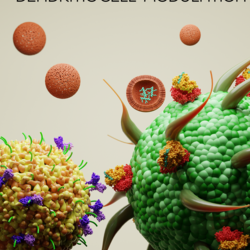Thesis defense Daniëlle ter Braake
- Location
- Academiegebouw
- Date
- Tuesday, May 21, 2024 at 12:15 PM - Tuesday, May 21, 2024 at 1:15 PM

All promotions can be followed live via this link:
https://video.uu.nl/lives/senate_hall_phd_defense_2023_2024/
The immune system protects the body against bacteria, viruses, and other pathogens. It is very good at recognizing molecules on the surfaces of pathogens, called antigens. When the immune system malfunctions, however, it will not be able to distinguish pathogenic antigens and self-antigens anymore. Therefore, the immune system will start attacking your own healthy cells and tissues. This is called loss of immune tolerance, and can lead to the development of autoimmune diseases, such as rheumatoid arthritis (RA).
Current treatments for RA focus on improving the quality of life by reducing disease symptoms. The downside to these medications is that they not only inhibit the immune response to self-antigens, but also to pathogenic ones, leaving patients more susceptible to other diseases. To circumvent this, antigen-specific immunotherapies, targeting only the self-antigen causing the autoimmune disease, could provide an excellent solution.
In this thesis, novel ways for inducing antigen-specific immune tolerance are explored. Dendritic cells (DCs) are immune cells that can presenting antigens on their cell surface to T cells, which results in an inflammatory or inhibitory (through regulatory T cells (Tregs)) immune response. For the treatment of RA, DCs need to induce RA-antigen-specific Tregs. To help DCs do this, these cells can be modulated by immunomodulators to become tolerogenic DCs (tolDCs). TolDCs are able to induce Tregs and inhibit inflammatory T cells in an antigen-specific manner.
In this research, immunomodulators and nanoparticles are successfully used for the induction of antigen-specific tolDCs and Tregs in vitro and in vivo. Treatment with the nanoparticles described in this thesis, efficiently prevented disease development in murine models for RA. Even in mice with established RA, nanoparticle treatment effectively inhibited disease progression. This thesis provides promising insights into the effect of dendritic cell modulation on the induction of antigen-specific immune tolerance.